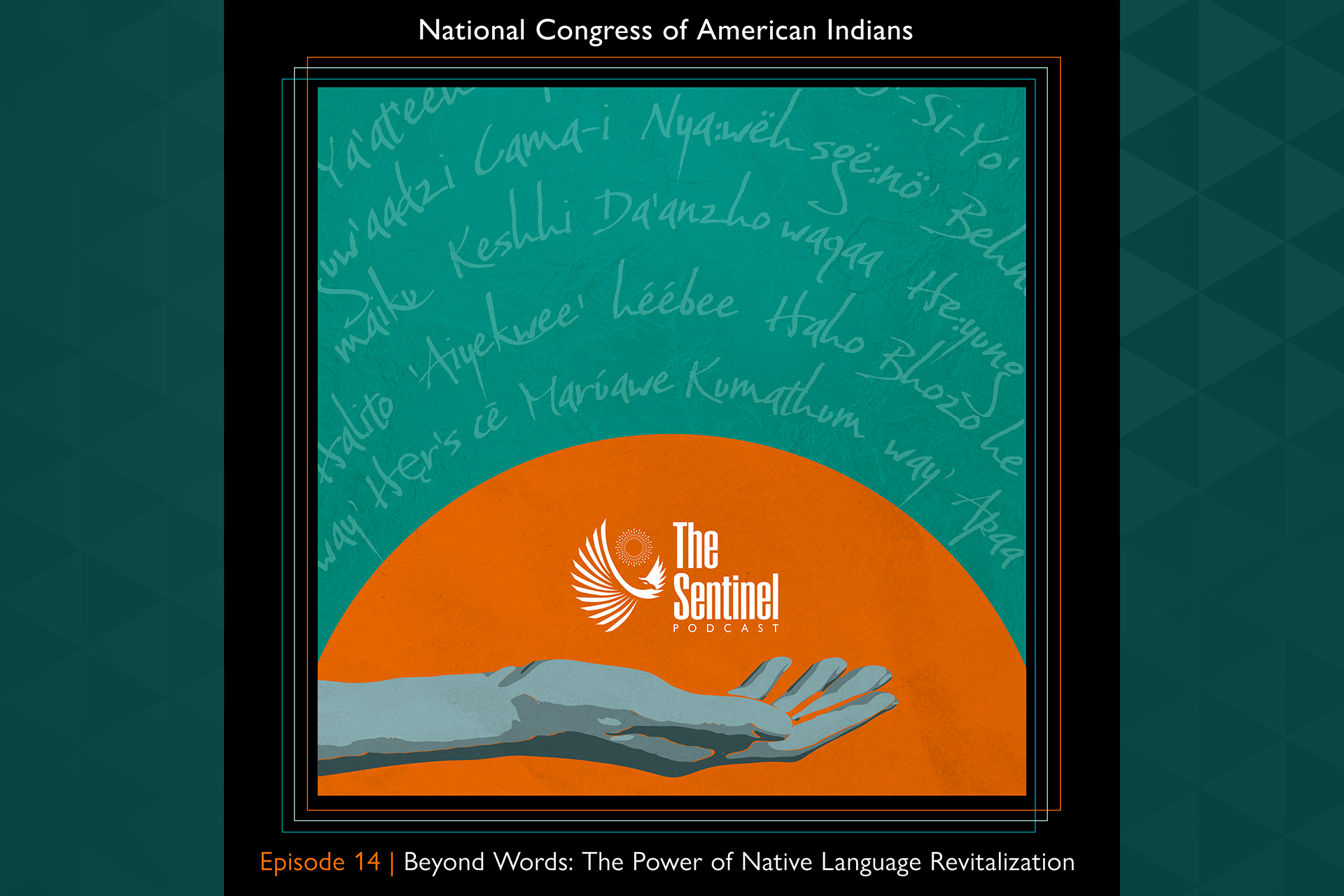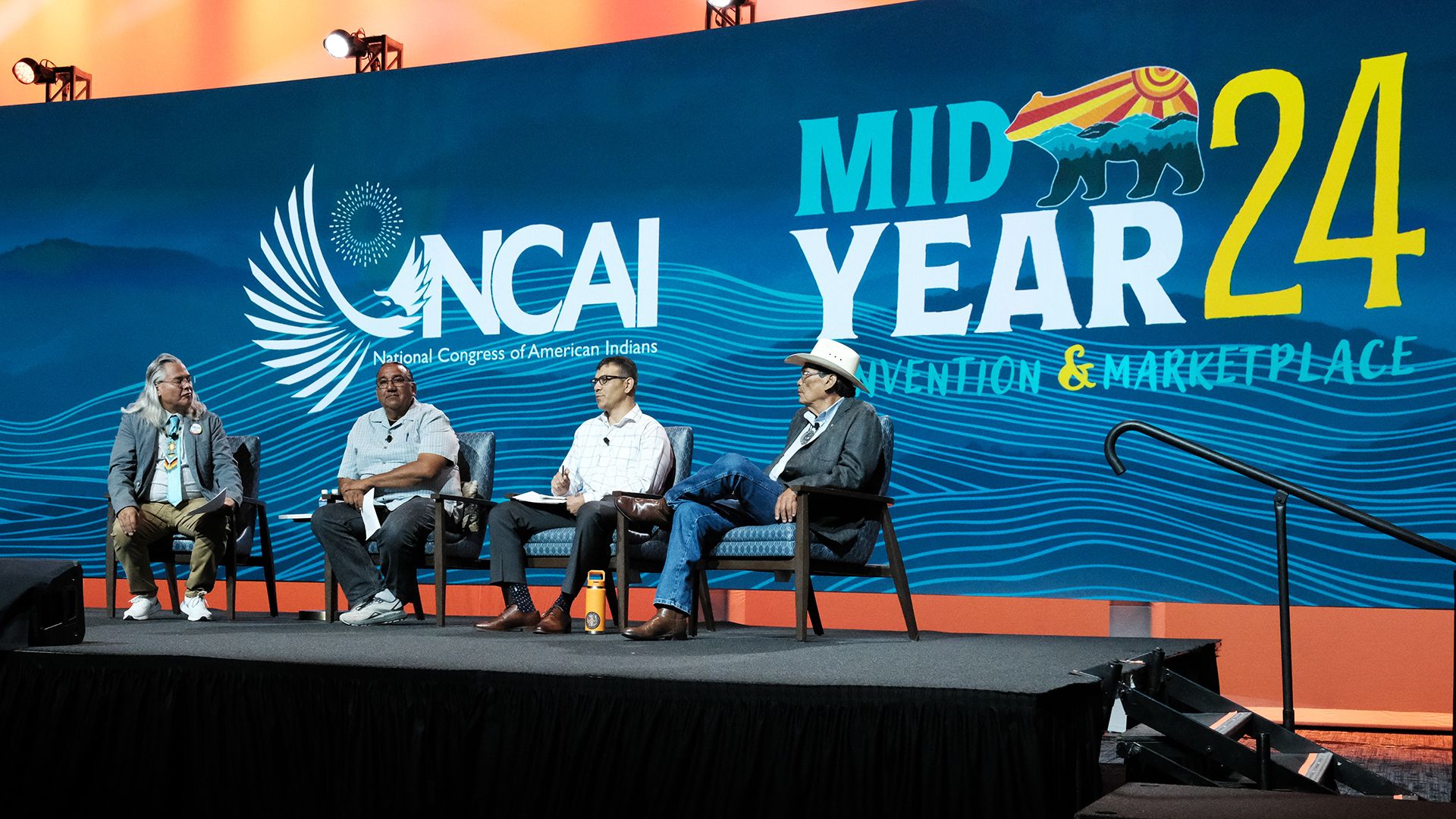
LISTEN NOW:
The survival of American Indian and Alaska Native languages is essential to the success of tribal communities and Native ways of life. However, without urgent and sustained intervention, far too many Native languages risk extinction within the coming decades. In this episode of The Sentinel, we highlight the urgency of this issue, and examine the creative and innovative solutions that many tribal communities are undertaking to counteract language loss.
First, we hear from Daniel Golding (Fort Yuma Quechan Indian Tribe), producer of the documentary “Language is Life,” which aired on the PBS network as part of the “Native America” series. Golding sheds light on the inherent challenges of revitalizing Native languages and his own unique personal perspective as he embarked upon learning the Quechan language.

Left to Right: Aaron Payment, Daniel Golding, Dr. Thomas Belt, & Beau Carroll take part in a panel about Language Preservation at the NCAI 2024 Mid Year Convention & Marketplace in Cherokee, NC
READ THE BLOG:
Historically, indigenous communities across the globe have passed down their languages from generation to generation. However, colonization and cultural assimilation have jeopardized these languages, pushing them to the brink of extinction. When a language fades, identity is lost. Preserving languages is critical if we want to promote cultural diversity and richness. Many Native communities rely on oral transmission, rather than written, to pass on knowledge, customs and traditions. As language becomes jeopardized, so does the cultural transmission that goes with it.
Throughout its history, NCAI has been instrumental in the effort to preserve Native languages. The organization’s advocacy has taken on a number of forms including: supporting legislation to protect traditional ways of speaking, calling for increased funding for language education and immersion programs, and formally recognizing that native languages are in a state of emergency.
For example, in 1990, NCAI endorsed the Native American Languages Act, the first major piece of legislation to preserve, promote, and protect Native languages. By the mid-1990s, NCAI began using the resolutions process to further this mission. At the Mid Year Conference in Spokane, Washington, NCAI leaders stated that “the United States government actively suppressed our native languages, directly contributing to their dramatic decline.”
Then, NCAI called upon the federal government to increase funding for Tribal Nations for language recovery and teaching programs. The membership also adopted a resolution addressing Native youth and calling for development and funding of Native language immersion programs in pre-schools, elementary schools, and secondary schools throughout Indian Country. NCAI also established a Native Language Task Force that meets twice annually.
More recently, at the 2024 NCAI Mid Year Convention and Marketplace held in Cherokee, North Carolina, attendees heard from Native language speakers and advocates throughout the meeting sessions. They were able to watch a screening of the documentary “Language is Life”, which aired on PBS as part of the highly acclaimed “Native America” series. Then, a breakout session conducted by the Eastern Band of Cherokee Indians delved into their efforts to preserve and revitalize their language. Lastly, the Third General Assembly hosted a panel on Native Language Preservation featuring a lineup of speakers from the Sault Ste. Marie Tribe of Chippewa Indians, the Cherokee Nation, the Eastern Band of Cherokee Indians, and the Fort Yuma Quechan Indian Tribe.
Out of these discussions came a common theme. While significant progress has been made towards preserving Native languages in recent years, there are still challenges associated with maintaining languages across generations. As younger generations are exposed to other languages through the Western education system and media, the usage of native languages declines. And when communities have limited resources, support and funding for language revitalization efforts, these challenges become even more difficult to overcome.
NCAI recognizes that the preservation of Native languages is not just a linguistic issue, but a basic need to uphold cultural diversity and respect the rights of American Indian and Alaska Native peoples. When a language fades away, it is not only words that are lost, but an entire way of life and understanding of the world.
